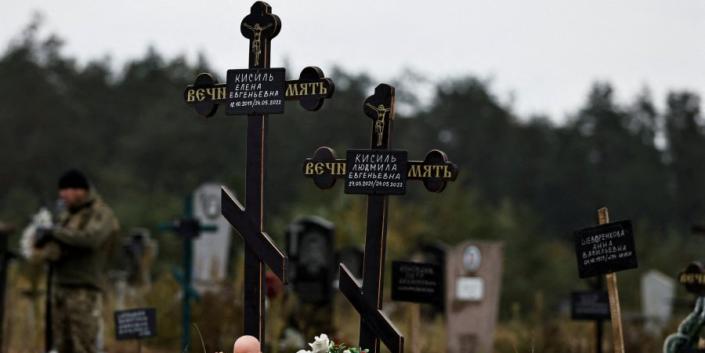
Moreover, his speech at the Valdai Discussion Club reaffirms that Russia’s war against Ukraine should be considered by the world as an act of genocide.
In their latest update, ISW analysts focused on Putin’s long pseudo-historical speech at the Valdai Discussion Club, in which the dictator continued to deny Ukrainian sovereignty. Putin claimed that “the single real guarantee of Ukrainian statehood, sovereignty and territorial integrity” allegedly “could only be Russia, which created today’s Ukraine.”
Read also: Biden has no plans to meet with Putin at G-20 summit
The experts also point out another of Putin’s similar delusions: that it is an alleged “historical fact” that Ukrainians and Russians are fundamentally “one people”, falsely divided into “different states.” The day before, Putin claimed that Ukraine had allegedly “lost its sovereignty” and become a vassal of NATO.
“Putin’s statements reject the legal fact that Ukraine is a fully sovereign state, that the Russian Federation recognized Ukraine’s sovereignty, and that the Ukrainian people exist as a distinct nation,” ISW said.
Read also: This is not just war — this is genocide
“Putin’s perpetuation of the narrative that Ukraine and Russia are a single people separated into different states by arbitrary historical circumstance indicates his continued objective to destroy the Ukrainian state and erase the notion of a Ukrainian people,” ISW went on.
Answering questions after his speech at the Valdai Club, Putin added: “If some part of that single ethnicity at some moment decided that it had reached such a level as to consider itself a separate people, then one could only respond with respect.”
ISW analysts said the conditional in this comment underscores Putin’s rejection of the idea that there is currently any independent Ukrainian national identity.
“These statements, along with many Russian actions, must cause serious reflection on the question of whether Russia’s war against Ukraine is a genocidal action since genocide is legally defined as ‘acts committed with intent to destroy, in whole or in part, a national, ethnical, racial or religious group.’”
In their report, ISW analysts drew special attention to a new threat from the Kremlin voiced by Konstantin Vorontsov, Deputy Director of the Department for Non-Proliferation and Arms Control of the Russian Foreign Ministry.
Read also: Ukraine uncovers another mass grave in Kharkiv Oblast, 17 bodies recovered
Speaking at the United Nations, Vorontsov threatened that Russia might attack Western commercial satellites used to aid Ukraine, describing them as “quasi-civilian infrastructure” that Russia might consider a “legitimate target” to strike.
In turn, U.S. National Security Council spokesman John Kirby said Washington would respond to any such attack on U.S. infrastructure.
Read also: Maxar shows fortifications of Russia’s Wagner mercenary company near Hirske in Luhansk Oblast
In other news, the forces of Russia’s Wagner mercenary company, owned by Putin associate Yevgeny Prigozhin, “may be further developing its air warfare capabilities and fielding more complex equipment on par with the conventional Russian military,” ISW said.
It pointed to information from Russian military bloggers, according to which Wagner is recruiting people “to form and or replenish the crews of the Pantsir-S1 air defense missile systems, the S-300 air defense system, helicopters and fixed-wing attack aircraft, and electronic warfare specialists.”
It was not previously known that Wagner PMC independently operates combat aircraft, but “it could begin to do so as the Russian military grows increasingly reliant on Wagner forces,” ISW experts said.
Commenting on the statements of Russian military propagandists that Wagner has become “an example of a contract army,” the Institute’s analysts believe that such wording only emphasizes that Wagner seems to be “emerging as a parallel military alongside the Russian Ministry of Defense.”
Other conclusions of ISW analysts over the past day:
Russian sources claimed that Ukrainian forces conducted counteroffensive operations in northeastern Kharkiv Oblast and along the Kreminna-Lysychansk line (Luhansk Oblast);
Russian forces are continuing to make defensive preparations along the east bank of the Dnipro River in Kherson Oblast;
Read also: What awaits Kherson and how Putin is changing tactics
Russian sources claimed that Ukrainian forces conducted limited ground assaults in Kherson Oblast;
Russian forces continued to conduct ground attacks in Donetsk Oblast;
The Russian military sent mobilization notices to foreign citizens working in Russia;
Russian and occupation administration officials began seizing residents’ cell phones in Russian-occupied territories to support law enforcement and operational security measures.
Map of hostilities: Ukrainian Armed Forces offensive in Kherson Oblast and north-east of Ukraine, fighting in Donbas
Read the original article on The New Voice of Ukraine




